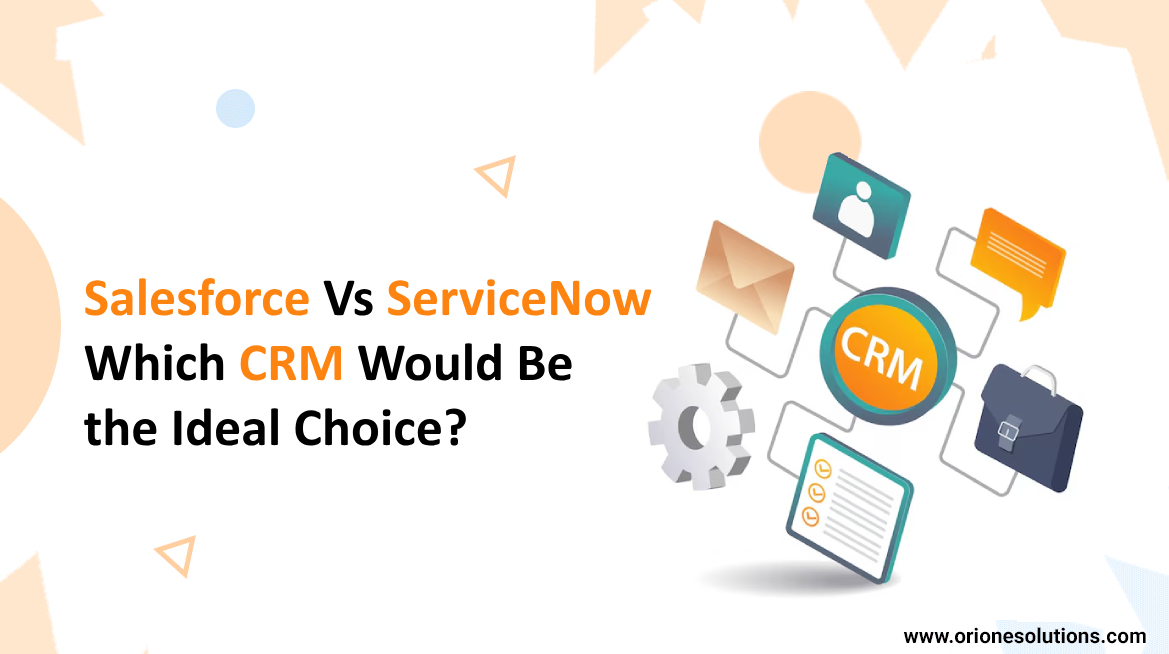In this era of advanced technologies and digitization, every business’s success depends on the best customer experiences. However, the term ‘experience’ not only focuses on customer-specific services. It covers the entire journey of customers associated with that particular solution.
Additionally, with the advancing tools and technologies, many businesses have now shifted from providing phone support to leveraging cloud-support CRM systems. There are two most popular CRM platforms with increased adoption to ensure better customer satisfaction- Salesforce vs ServiceNow.
These help not only execute the best customer interactions but also assist in elevating overall business performance. Salesforce can be defined as an extensive CRM helpful in performing service management-related tasks. On the other hand, ServiceNow is more focused on managing customer relationships.
But how exactly do these CRM differ from each other? In this write-up, we will take a brief overview of Salesforce vs ServiceNow and explore the key differences between the two. Also, it will help you make the ideal choice for your organization.
Overview of Salesforce
Salesforce is a well-renowned cloud-based software company with a specialization in CRM. It was founded in 1999 and since then it has evolved as a key player in the software sector. Salesforce CRM is accustomed to quality customer management and offers organizations a modular architecture that enables easy customization and scalability of capabilities depending on specific needs.
Besides, Salesforce offers a range of cloud apps for AI and analytics. Such capabilities ensure Salesforce’s emphasis on creating strong customer relationships.
Pros of Salesforce
- Salesforce provides several tools to handle customer relationships, sales-specific procedures, and marketing campaigns.
- The CRM supports comprehensive third-party integrations.
- Salesforce provides analytics and AI-backed insights. These help businesses make well-informed data-driven decisions, identifying trends and uncovering growth opportunities.
Cons of Salesforce
- Salesforce CRM could be costly for small-sized businesses. The customization choices and features come at a set cost that may fail to align with small budgets.
- The Salesforce CRM comes with a need for continual adaptation and learning. Salesforce keeps on introducing new functionalities and users are required to stay updated on such changes to ensure improved workflows.
Overview of ServiceNow
ServiceNow is a highly popular ITSM platform known for simplifying and automating all IT service management operations. It provides access to multiple tools, all aimed at enhancing IT service delivery, incident management, and workflow optimization.
Although ServiceNow is focused on IT operations, its additional capabilities involve customer service management, HR services, and many other functions.
Pros of ServiceNow
- ServiceNow is leading in the IT service management field and provides several tools for managing problems.
- Quick problem and incident management tools help to track and resolve IT concerns efficiently and minimize business workflow disruption.
- ServiceNow has automation capabilities that simplify IT procedures, minimizing human efforts and enhancing efficiency.
Cons of ServiceNow
- Complex learning of ServiceNow makes it challenging for non-IT users to utilize the CRM efficiently.
- Organizations may need to invest in more significant personalization efforts to customize ServiceNow capabilities to their needs.
Salesforce Vs ServiceNow: Key Comparisons to Know
Both Salesforce and ServiceNow provide several solutions to handle relationships with customers and simplify business operations. Also, with the increased popularity, many CRM development services companies have begun leveraging these platforms to deliver best-in-class services.
However, both differ in their abilities and it is essential to understand how they contribute to digitization. Let’s discuss it below.
Core Focus
The main focus of Salesforce is on CRM to help businesses manage sales, marketing, and customer connections. It offers all the necessary customer management tools to boost engagement, simplify sales, and automate marketing efforts. According to statistics, many businesses experienced 25% much speedier automation of operations when implementing Salesforce.
On the other hand, ServiceNow focuses on ITSM. It offers several tools to handle IT services and operations. The prime functionality of ServiceNow lies in improving IT service delivery and enhancing workflows.
Integration Capabilities
Salesforce boasts a huge ecosystem of integrations, all thanks to AppExchange. Thus, ensuring simplified connectivity with multiple third-party apps. Such an integration capability allows organizations to scale up Salesforce’s features and build a CRM system that satisfies the unique requirements.
ServiceNow, on the other hand, offers several integration capabilities but is constrained to IT tools and systems. It facilitates integrations with cloud platforms, enterprise apps, IT management tools, and so on. Thus, ensuring efficient and smooth execution of IT operations and flow of data across several systems.
UI/UX
Salesforce is widely known for its user-friendly and responsive interface. The platform is beneficial for marketing and sales teams to navigate and leverage features efficiently. Also, Salesforce’s design is focused on easy accessibility and use so that users can find data quickly when in need to perform tasks.
On the contrary, ServiceNow comes with a more technical user interface tailored keeping in mind the usability of IT professionals. The platform provides easy-to-customize dashboards and in-depth analytics. It enables the IT teams to keep track of service performance, monitor mishaps, and handle IT workflows.
Customization and Scalability
Salesforce is easy to customize and offers comprehensive support to develop custom solutions that align with the business’s specific requirements. From a wide variety of customization options like custom fields, automation, and complex workflow, Salesforce provides everything.
]Also, the scalability of Salesforce makes it an ideal choice for businesses of all types and sizes.
Contrarily, ServiceNow offers multiple customization choices, especially for IT processes and workflows. Businesses can tailor modules of ServiceNow as required so it aligns with the IT management needs, custom workflow development, and more. In short, ServiceNow’s scalability can be accommodated as per the growing demands.
Customer Support
The speed and quality of support play a significant role when comparing ServiceNow and Salesforce. Talking about Salesforce, its customer support facility is segmented into 3 levels. The Standard level assistance is offered via the Trailblazer community and Salesforce Trailhead. Customers can subscribe to the Premier tier if they need detailed assistance.
On the other hand, ServiceNow’s customer service is about collaborating with multiple departments and fixing complaints quickly. According to a report by ServiceNow, 84% of customers recommend a brand or advise choosing a company depending on great customer support.
Fortunately, ServiceNow is cost-efficient and ensures 24/7 on-call support. In addition to the contact support page, ServiceNow’s live chat functionality on a website makes its customer support better.
Simply put, Salesforce support is ideal for large enterprises looking for proactive help. Contrarily, ServiceNow can be leveraged by those considering delivering budget-friendly support to their customers.
Which is Better, Salesforce Vs ServiceNow
Salesforce vs ServiceNow, both are the two most popular platforms with unmatched functionalities. Hence, it is quite inevitable to experience confusion about which option would be ideal for your business.
Choose Salesforce when your business needs to focus on managing customer relationships, marketing efforts, and sales procedures. Thus, making it ideal for businesses looking to enhance their overall CRM tactics. On the contrary, you can choose ServiceNow when in need of access to a wide range of tools to handle IT services and business workflows with efficiency.
FAQs
Q1: How do ServiceNow and Salesforce use AI, and which is better for businesses?
Answer: Both ServiceNow and Salesforce utilize Artificial to boost business operations and enhance overall customer experiences. For example, using AI, ServiceNow excels in IT service management. On the other hand, Salesforce is focused on customer relationship management. However, the choice relies on particular business needs – it could be IT-centric vs customer-centric solutions. So, assess the features carefully to pick the best fit.
Q2: Will ServiceNow overtake Salesforce?
Answer: Salesforce and ServicesNow, both are designed to target varying areas. For example, Salesforce excels in managing customer relationships. While ServiceNow leads in IT service management. Both the platforms can expand the services in the long run but none of these could overtake the other in their significant areas of expertise.
Q3: Is ServiceNow & Salesforce hosted in AWS?
Answer: Yes, one can host Salesforce and ServiceNow on AWS, but both are distinct CRM platforms and vary in functionalities. Hence, the choice between the two depends on the specific organizational requirements.
Q4: Can Salesforce replace ServiceNow?
Answer: Salesforce and ServiceNow differ in their strengths and capabilities and serve varying purposes. While Salesforce is known for improving customer relationship management and automating sales processes, ServiceNow specializes in IT service management. So, it highly depends on the business needs and yes, Salesforce’s functionalities may surpass ServiceNow’s but may not be able to replace it.
Final Thoughts
Altogether, no matter which platform you choose, the business requirements must be met efficiently. Understand your goals and pain points and make the choice.
In addition, it would be highly beneficial to hire a renowned web development company who has a team of expert consultants.
We at Orion eSolutions possess such professionals who can help you leverage the full potential of both Salesforce and ServiceNow platforms and accelerate business growth.









